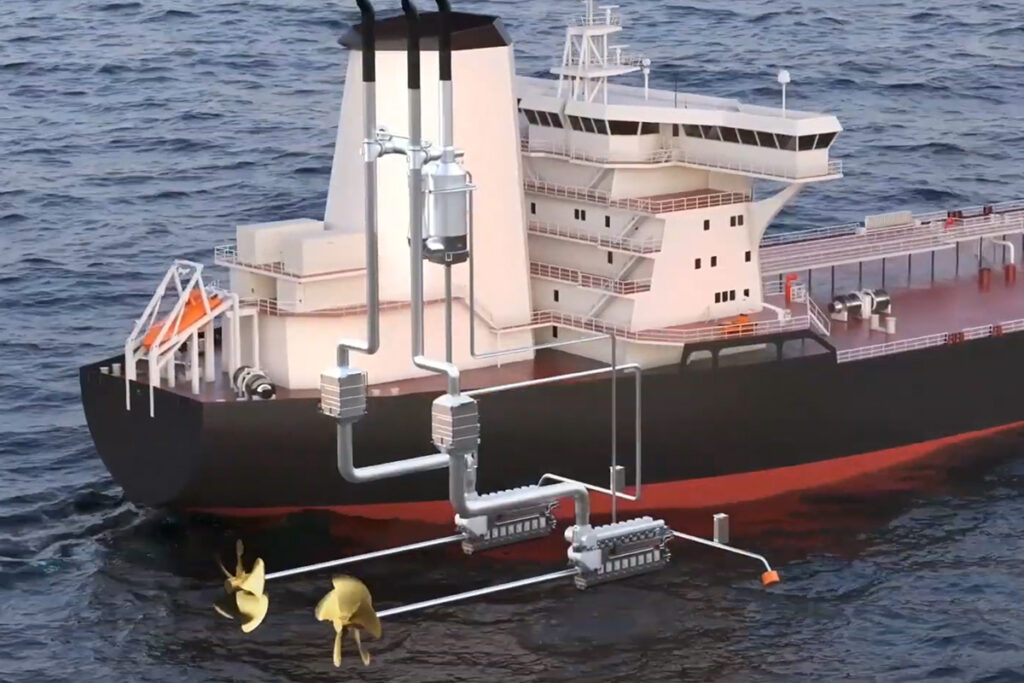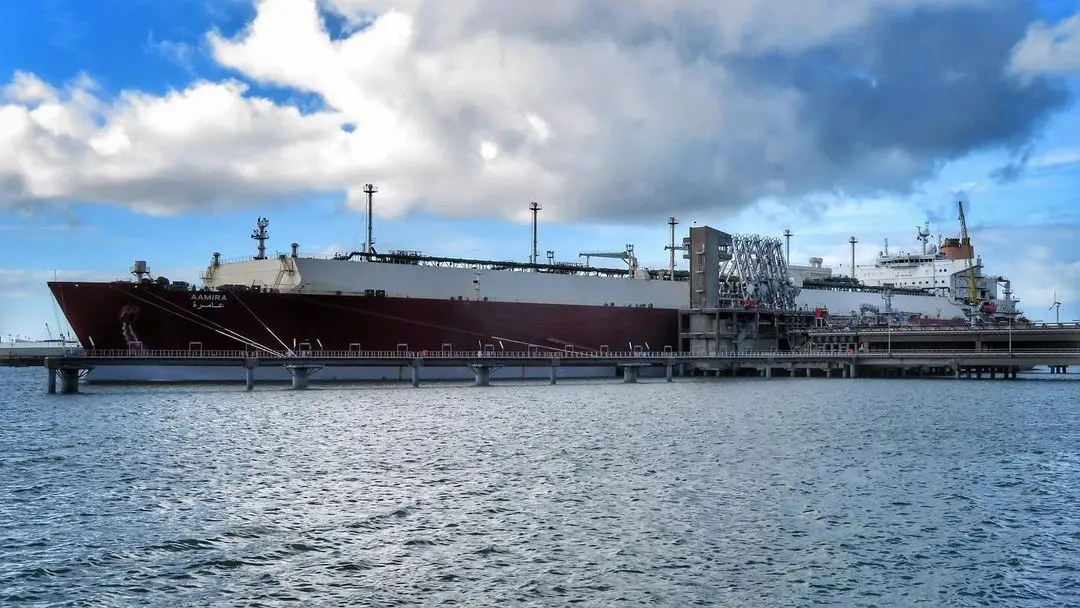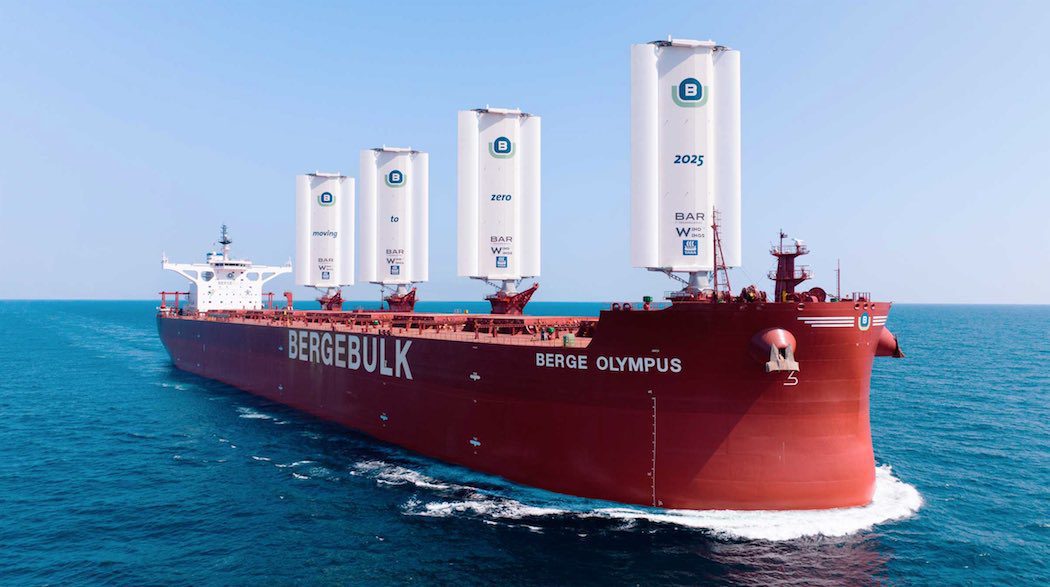Marine pollution has become a critical concern globally, with ships being a significant source of pollution in oceans and seas. One of the primary contributors to pollution by ships is the exhaust gas emissions produced by their engines.
These emissions contain harmful substances like sulfur oxides (SOx) and nitrogen oxides (NOx), which are detrimental to the environment and human health. In recent years, the implementation of ship scrubbers has emerged as an innovative solution to reduce the impact of exhaust gas emissions on the environment.
In this article, we will discuss what ship scrubbers are, how they work, their benefits, and the challenges in their implementation.

What are Ship Scrubbers?
A ship scrubber, also referred to as an exhaust gas cleaning system, is a technology used in ships to clean the exhaust gases produced by the engines. These gases contain harmful substances such as sulfur oxides (SOx), nitrogen oxides (NOx), and particulate matter (PM) which can pose a serious threat to human health and the environment. Ship scrubbers are designed to remove these pollutants from the exhaust gases before they are released into the atmosphere.
Ship scrubbers come in various types, and each type uses different techniques to clean the exhaust gases. For instance, open-loop scrubbers clean the exhaust gases by using seawater, while closed-loop scrubbers clean the gases using freshwater. There are also hybrid scrubbers that combine the features of open and closed-loop scrubbers.
How do Ship Scrubbers Work?
Ship scrubbers work by using different techniques to clean the exhaust gases produced by ship engines. The most common technique used by scrubbers is the wet scrubbing process. This process involves spraying the exhaust gases with water, which dissolves the harmful substances present in the gases, such as SOx and NOx. The scrubber then removes the dissolved substances from the water, leaving the gases cleaned and ready for release.
The wet scrubbing process takes place in a tower or column, which contains a scrubbing solution, usually seawater or freshwater. The scrubber sprays the exhaust gases with the scrubbing solution, causing a chemical reaction that dissolves the harmful substances in the gases. The scrubber then removes the dissolved substances from the scrubbing solution using a separation process. The cleaned gases are then released into the atmosphere.
In addition to wet scrubbing, there are other techniques used by ship scrubbers such as dry scrubbing, which uses a dry chemical to remove pollutants from the exhaust gases. There are also hybrid scrubbers that combine the features of wet and dry scrubbers. Hybrid scrubbers are designed to be more efficient and effective in cleaning exhaust gases.
Types of Ship Scrubbers
There are three primary types of ship scrubbers: open loop scrubbers, closed loop scrubbers, and hybrid scrubbers. Each type of scrubber uses a different technique to clean the exhaust gases produced by the ship engines.
Open Loop Scrubbers
Open loop scrubbers use seawater to clean the exhaust gases. The scrubber system pumps seawater from the ocean and sprays it onto the exhaust gases, which causes the harmful substances in the gases to dissolve in the water. The cleaned water is then discharged back into the ocean. This type of scrubber is more affordable and simpler to operate than other types.
However, it is also the most controversial because it can release pollutants into the ocean and may not meet local environmental regulations.
Closed Loop Scrubbers
Closed loop scrubbers use freshwater to clean the exhaust gases. The scrubber system circulates freshwater through the system to clean the exhaust gases. The freshwater is then treated and reused for cleaning the exhaust gases in the future. This type of scrubber is more expensive and requires more maintenance than open loop scrubbers. However, it is more environmentally friendly and can meet the most stringent environmental regulations.
Hybrid Scrubbers
Hybrid scrubbers combine the features of both open and closed loop scrubbers. They can switch between the two types of scrubbers, depending on the ship’s location and environmental regulations in the area. Hybrid scrubbers can operate in open loop mode when the ship is in international waters or in areas where open loop scrubbers are permitted.
When the ship is in port or in areas with strict environmental regulations, the scrubber can switch to closed loop mode. This type of scrubber is becoming increasingly popular as it can offer a balance between cost, environmental impact, and regulatory compliance.
In addition to these primary types of scrubbers, there are other variations such as dry scrubbers, which use a dry chemical to remove pollutants from the exhaust gases, and seawater hybrid scrubbers, which combine seawater and freshwater to clean the exhaust gases. The choice of scrubber system will depend on various factors such as the ship’s size, engine type, operating conditions, and environmental regulations in the area.
Benefits of Ship Scrubbers
Ship scrubbers provide a wide range of benefits, including environmental, economic, and social advantages.
1. Environmental Benefits
Ship scrubbers are an effective way to reduce the impact of exhaust gas emissions on the environment. By cleaning the exhaust gases before release, ship scrubbers significantly reduce the amount of harmful substances, such as sulfur oxides (SOx), nitrogen oxides (NOx), and particulate matter (PM), that are released into the atmosphere.
This results in improved air quality, reduced risk of acid rain, and mitigated harm to the ozone layer.
2. Economic Benefits
Ship scrubbers offer several economic benefits for ship owners. One of the most significant benefits is the reduction in fuel consumption and cost savings. By cleaning the exhaust gases before release, ship scrubbers allow ships to use lower quality and less expensive fuels that would not be compliant with environmental regulations otherwise. This results in a reduction in fuel costs, which can be a significant cost-saving for ship owners.
Moreover, ship scrubbers help to extend the lifespan of the ship’s engine by reducing the amount of corrosive materials that come into contact with it. This leads to lower maintenance and repair costs for the ship owner in the long run.
Overall, ship scrubbers offer significant economic benefits for ship owners, including fuel cost savings, compliance with environmental regulations, and lower maintenance and repair costs.
3. Social Benefits
Ship scrubbers provide significant social benefits by improving the health and well-being of people living in and around port areas.
By reducing the amount of harmful substances released into the atmosphere, ship scrubbers help to improve air quality, which in turn reduces the risk of respiratory illnesses and other health issues in nearby communities.
In addition, ship scrubbers also reduce noise pollution, making ports and harbors more comfortable and peaceful for nearby residents.
Challenges in the Implementation of Ship Scrubbers
While ship scrubbers offer several benefits, their implementation also faces several challenges.
1. Regulatory Challenges
One of the primary challenges in implementing ship scrubbers is complying with regulations. Different countries have different regulations on the use of scrubbers, with some countries prohibiting their use altogether. As a result, ship owners may face challenges in complying with these regulations, particularly when operating in multiple regions with different regulations.
2. Cost Challenges
Another challenge in implementing ship scrubbers is the cost. Scrubbers can be expensive to install and maintain, requiring significant capital investment. In addition, the operating cost of scrubbers, such as water and energy consumption, can also be high.
3. Technical Challenges
Implementing ship scrubbers can also present technical challenges. For example, different types of scrubbers may be more suitable for different types of ships, depending on their engine type and size. Additionally, the installation of scrubbers can be complex and may require significant modifications to the ship’s existing systems.
Conclusion
Ship scrubbers are an innovative solution to reduce the impact of exhaust gas emissions on the environment. They offer several benefits, including environmental, economic, and social benefits. However, their implementation also presents several challenges, such as regulatory, cost, and technical challenges.
Despite these challenges, the use of ship scrubbers is expected to increase in the future, as the shipping industry continues to prioritize environmental sustainability
- Types of Gas Carriers as per IGC Code – April 22, 2025
- Wind-Assisted Propulsion Systems (WAPS): A Game Changer for Maritime Decarbonization – February 6, 2025
- 10 Boat Salvage Yards in California – January 25, 2025





